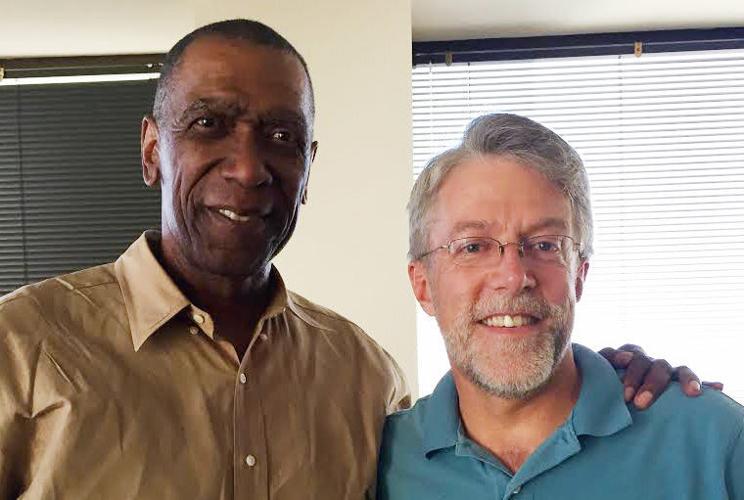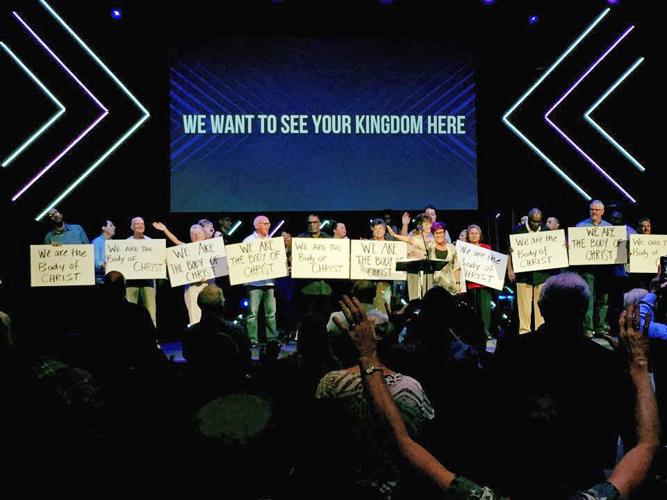Martin Luther King Jr.’s comment that Sunday morning is “the most segregated hour in this nation” still rings true for many congregations.
But for some Tucson pastors, continued racial isolation is not something they’re willing to accept. For more than four years, about 15 pastors have gathered for something they call the Pastor Partnership. Every month, they eat, tell stories or watch movies.
Most would self-define as evangelical, though they are wary of the word’s political implications. They represent a variety of Tucson churches, some predominantly black or white. A few lead Hispanic congregations. They decided years ago that race would not divide them.
Here, deep friendships have developed and tough questions are posed.
They challenge each other’s political leanings and cultural assumptions.
Tucson does have churches with multicultural congregations, but that’s not the norm, said the Rev. Dave Drum, church domain director for Christian nonprofit 4Tucson.
LifeWay Research released a study in January 2015 showing that only about one-third of Americans opted to regularly worship in a place where they would be a minority. Previous LifeWay studies have shown that more than 80 percent of congregations have a predominant race.
Drum and the other church leaders involved in the Pastor Partnership want to see greater unity in and among Tucson’s churches. Their focus is racial reconciliation.
They see isolation, not animosity, as the primary reason most churches stay racially segregated. So they’re figuring out ways to change that.
Movies with racial themes — “Woodlawn” and “Selma,” for example — have allowed churchgoers to show up and talk it out in discussion groups following the films.
The group planned one of its first big events following the shooting at Charleston’s Emanuel African Methodist Episcopal Church. They called the worship service Love Conquers Hate. In September, the Pastor Partnership hosted the service Love Conquers Racism. Both drew several hundred people.
“Let’s not candy-coat it; let’s not just come together and sing a few worship songs and say, ‘Yeah, we love each other and go home,’” said the Apostle Warren Anderson Jr. of Living Water Ministries. “We want people to leave here with a sense that we got something done, we took another step, but we still have a ways to go.”
The Star sat down to talk with Drum and Anderson, founding members of the Pastor Partnership, about race, church and what’s working in Tucson.
Remarks have been edited for length and clarity.
Back to the beginning
Anderson: “I just sensed in my spirit that there is a division here that the political atmosphere is creating in the body of Christ, which brought back memories of years ago when Ronald Reagan was president when someone said to me, ‘If you are a Democrat, how can you be a Christian?’ … When the election with Obama came up, it brought all of that back up, and really the desire to sit down with other pastors, white pastors as well as black pastors. … We started that journey of the Pastor Partnership, sitting down and addressing myths, addressing issues that tend to divide us … and the thought was of all entities on the face of this earth, surely the church can come together because of who we have in common, the Lord Jesus Christ.”
Drum: “And how I remember that being said, too, was that we’re here as followers of Christ. We’re not here as Republicans or Democrats … and everybody unanimously agreed to that.”
Anderson: At the first meeting “we were just feeling each other out and thinking, ‘Oh boy, what am I doing here?’”
Talking through
the tough stuff
Drum: “Because we have been meeting this whole time, when Ferguson happened and South Carolina happened and all of the high profile tragedies that have happened in our country, just to be able to sit down and say, ‘Help me understand how you react to this, at an emotional level, at an intellectual level.’ We’ll use the example of a police shooting. Any time that has happened, I think culturally the first question that I ask is, ‘What are the facts of the situation?’ ”
Anderson: “Sometimes, you really can’t put your finger on it, but you just have a feel for it and a discernment of it and you know there is something in the atmosphere here that’s racial or systemic. … And in the cases if there is a law broken, it becomes a side issue … but this racial piece blooms … And I have to say in the Pastor Partnership, our white brothers can just really see the bigger picture that we’re talking about, which is really a blessing. At first, I was thinking they don’t get it. They won’t see it.”
Practical ways
to build bridges
Drum: “Join something that someone else started. That’s such a bridge builder because it’s easy to have something and invite other people to join you. Everybody and their uncle does that … but go find some other citywide event and join it. … So I started with 4Tucson five and a half years ago and we’re doing this Easter sunrise service for the evangelical community citywide, and I remember inviting (Anderson) to one of those first ones, and (he was) very polite, ‘Well thanks, I won’t be able to be there.’ And it’s not until the second one that I find out you guys have been doing sunrise services together for 30 years and I didn’t even know this.”
Anderson: “And don’t just be a cheerleader, but join in. … The sunrise service, the last one we had, Dave brought the message. That was an experience. That was the first time you didn’t have an African-American pastor bring the traditional sunrise service. Dave broke a color barrier. It was tremendous, and you know, our tradition is that we’re just lively and we like to shout a lot, a lot of amens and ‘Come on with it, brother!’ and we’re up on our feet, and he did that. He didn’t break tradition. He had us screaming and shouting, ‘Amen!’ He had us up on our feet.”
Food, laughter and long church services
Anderson: “If you’ve got some black music, we’ll come (to predominantly white churches). … Plus you get out earlier, too! Even some of my own folks say, ‘Pastor, we have church much too long.’”
Drum: “How are you going to beat the Baptists to lunch?”
Anderson: “Exactly. We get there and y’all are finishing eating and we’re just getting in line. … Taking our members, with your early end time!”
Drum: “All the church in half the time.”
Anderson: “Everything you wanted in a worship service and you’re out to beat the afternoon dinner crowd. We laugh at ourselves.”





